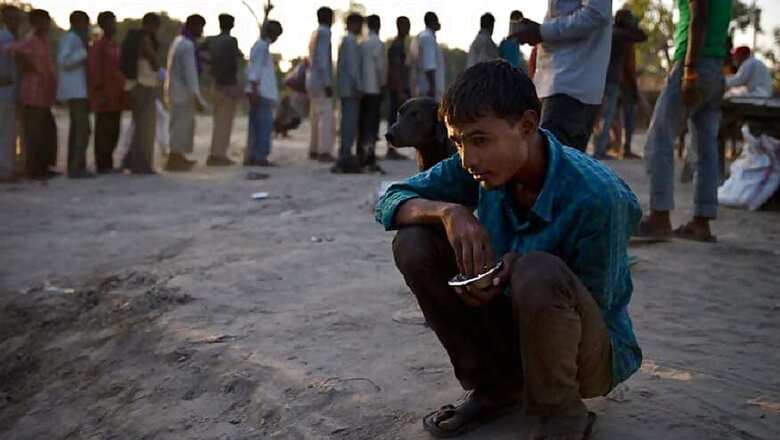
views
India is all set to enter the fourth stage of punitive lockdown as the cases of novel coronavirus in the country has crossed 90,000-mark, leaving 2,872 people succumbed to the infection so far. The impact of pandemic is so brutal that it could push at least 260 million people in the country into poverty due to the economic fallout, according to the United Nations and Oxford Poverty and Human Development Initiative (OPHI).
The 2019 UN Development Programme’s Multidimensional Poverty Index (MPI), developed in collaboration with OPHI at the University of Oxford, had reported in a study last year that India lifted 271 million people out of poverty between 2006 and 2016. This was the fastest absolute reduction in poverty among ten countries encompassing close to two billion people, the researchers noted, even as 369 million Indians remained poor, the highest globally, reports Huffington Post.
As Covid-19 hammered India’s economy and hundreds of millions of its citizens struggle to make out a living under a nationwide lockdown, over 260 million Indians, who are presently close to the poverty-line, are at risk of becoming the new poor, according to researchers such as the OPHI’s Sabina Alkire who worked on the 2019 numbers.
Unlike income poverty, multidimensional poverty does not depend on any single indicator. To monitor poverty, it takes multiple deprivations experienced by people in health, education and standard of living across 10 indicators — nutrition, child mortality, years of schooling, school attendance, sanitation, cooking fuel, drinking water, electricity, housing and assets are taken into consideration. People deprived in at least a third of the indicators, or 33 per cent of the indicators, are classified as poor, explains Huffington Post.
While under global Multidimensional Poverty Index (MPI), vulnerable are those people who experience deprivations in at least 20-33 per cent of the indicators. According to global MPI, in 2015-2016, 27.9 per cent of people in India were poor while 19.3 per cent were vulnerable to poverty.
Speaking to HuffPost India, Sabina Alkire, director at OPHI and the lead author of the 2019 study, said that people who are vulnerable in society are at risk due to various factors as the virus continues to spread in the country. “Three MPI indicators are also Covid-19 risk factors. These are sharing a household with a person who is malnourished, lack of safe drinking water and clean cooking fuel.”
Moreover, the coronavirus has also raised concerns of rising malnutrition in the country.
She explained, “The virus creates two big challenges - threats to life among the poor, and increase in poverty. The biggest cause for concern is the predictable short-term surge in malnutrition…Plus, it is very important to prevent malnutrition—particularly in children because it affects their brain development.”
Huffington Post quoted Bishwa Nath Tiwari, a senior official with UNDP’s Human Development Reports at the Bangkok Regional Office as saying that malnutrition would increase among vulnerable Indians due to income losses in view of nationwide lockdown and disruptions in food supply chains.
Prime Minister Narendra Modi had announced a nationwide lockdown on March 24 to curb the further spread of novel coronavirus in the country. Since then, the lockdown was extended thrice and is likely to extend further for the fourth time today as the Covid-19 cases continue to surge. The restrictions had led to an economic fallout.
Union Finance Minister Nirmala Sitharaman today outlined the fourth and final tranche of the Rs 20 lakh crore economic package estimated at 10 per cent of the GDP announced by Prime Minister Modi to jumpstart the economy in the face of coronavirus.
Earlier as well, the Modi government had announced a more than Rs 1.70-lakh crore package to alleviate the hardship of the poor hit by economic disruption due to coronavirus outbreak.

















Comments
0 comment